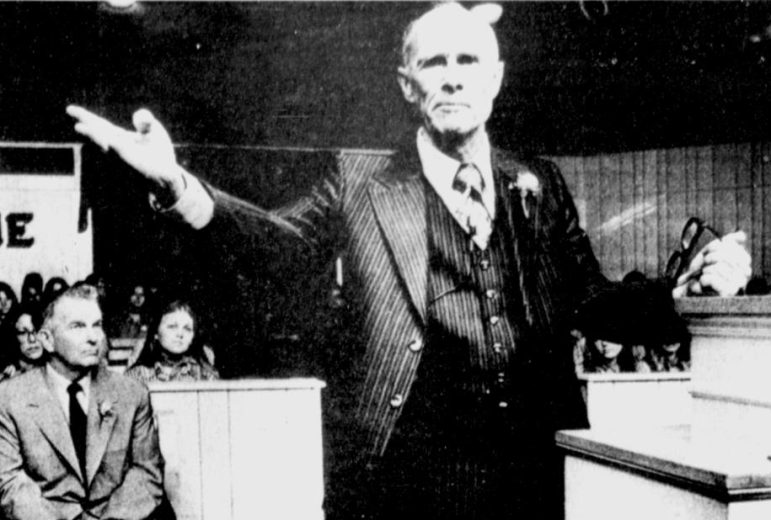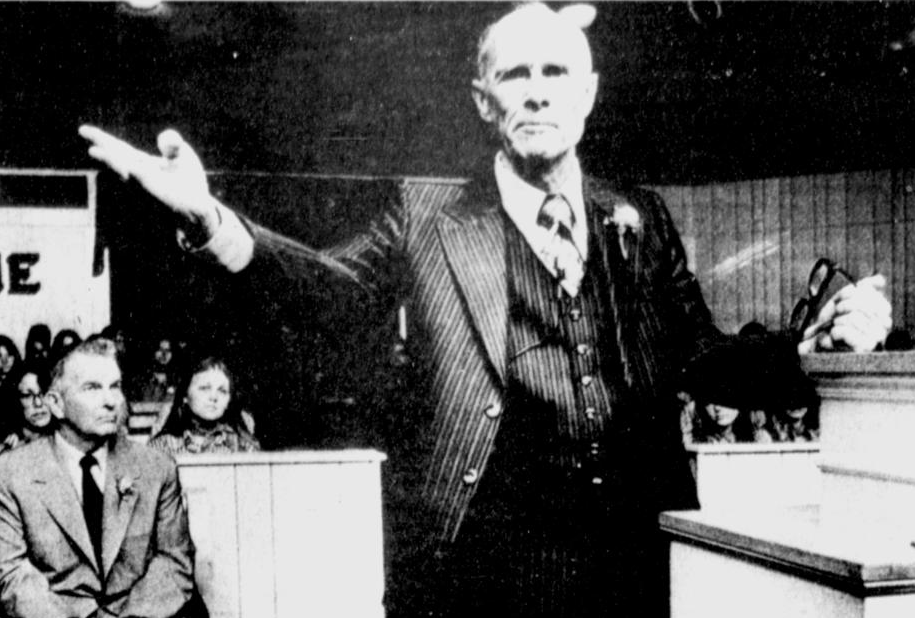
Ocala Star-Banner
The Anchor Home for Boys was one of many homes founded by a magnetic Baptist preacher and radio personality named Lester Roloff.
AUSTIN, Texas — While reporting recently on abuse allegations at a home for troubled teens, I realized that the article I was writing had been written before.
Sure, nobody had written about the Anchor Home for Boys, founded in Corpus Christi in the 1960s and reopened as Anchor Academy in Montana and then Missouri. Nobody had written about the boys who accuse the school of forcing them to spend hours exercising in freezing conditions with improper clothing, of barring them from speaking to anyone but a direct superior, of giving them nothing but peanut butter sandwiches to eat, of sleep deprivation and group beatings.
“Put your back against the wall and put your leg at a 90-degree angle and raise your arms,” one young man told me of a punishment he saw meted out. “If you drop your leg I’d punch you. If you drop your arms I’d punch you. If you say ‘no’ I’d punch you. I’d say that's torture.”
But I wasn’t the first one to find these sorts of stories, not by a long shot. Over the past two decades, dozens of unlicensed residential facilities for teens struggling with drug problems and various behavioral issues have been accused of physical and sexual abuse. A handful of these programs are based in Baptist thinking about the necessity of physical discipline in correcting a sinful path. (“Those who spare the rod hate their children, but those who love them are diligent to discipline them,” Proverbs 13:24). The Anchor Home for Boys was one of many homes founded by a magnetic Baptist preacher and radio personality named Lester Roloff.
A tall, skinny man with a warm smile and soulful voice, Roloff clashed with the state of Texas throughout the 1970s over licensing and oversight for his children’s homes. After his death in 1982, his successors continued to fight regulation. Over time, Texas grew inhospitable, homes directly or indirectly tied to Roloff’s legacy sprouted in Missouri, Florida, Louisiana and Mississippi.
If you’ve ever heard of Roloff’s homes, it may be because of a wave of news coverage between 1999 and 2001. A newly elected President George W. Bush established the White House Office of Faith-Based and Community Initiatives, which aimed to “eliminate unnecessary legislative, regulatory, and other bureaucratic barriers that impede effective faith-based and other community efforts to solve social problems.”
A mouthful, yes, but in plain terms this often meant leaving church-run treatment centers to operate without much state intervention.
Opponents of this idea found ample ammunition in the stories coming out of Roloff’s homes, which Bush, while governor, had invited back to Texas. In the Washington Post, Hanna Rosin reported on Roloff’s Lighthouse, where two boys spent more than 10 hours digging in a dirt pit after being tied to a truck and dragged through brush.
In Texas Monthly, Pamela Colloff wrote about Roloff’s Rebekah Home for Girls (the sister school to the Anchor Home), where one girl was beaten, chained in a room alone and forced to listen to Roloff sermons. In The American Prospect, Maia Szalavitz wrote a column called “Why Jesus is not a Regulator,” in which she described how some children had died in poorly regulated facilities, and many more suffered from post-traumatic stress disorder.
Those stories faded away as 9/11 took over the news cycle. Then, a few years ago, they reappeared. In Mother Jones, Kathryn Joyce wrote about torturous punishments at the Roloff-inspired New Beginnings Ministries. The Tampa Bay Times and the New Orleans Times-Picayune published long investigations on schools in their states. On CNN, Anderson Cooper ran a segment called “UnGodly Discipline.”
In almost every instance, administrators at these schools who go on the record argue that some physically demanding discipline is necessary to work with the most difficult-to-reach young people. At the Anchor Home for Boys and Anchor Academy, I heard numerous stories from young men who had a great time and believe that the abuse allegations are trumped up by men who, in the words of one former staffer, “never woke up to adult responsibilities.”
Though attitudes about appropriate disciplinary practices for children have certainly shifted over the last decade and a half, the debate on them is hardly closed. It is part of a permanently unfinished conversation about the best way to help children, one that reaches far past questions of state and federal oversight.
Urging that conversation forward, there will be journalists digging around, documenting stories of abuse. The homes of Lester Roloff will long be a place for them to look.
Financial supporters of The JJIE may be quoted or mentioned in our stories. They may also be the subjects of our stories.

Hi
I was in Jubilee for about nine months in 1984. I had to leave town because a friend of mine showed up at her door threatening to kill me and had a gun. It was the worst decision I ever made.There was a demon possessed female and I had to read her scripture to her for about eight hours. At that point I caught her demon. Fortunately I escaped the Baptist Church and never looked back. My counselor got my demon out and at that point I was saved for forever.I could write e a book about the Hell I endoured. It is a black part of my life. I got counseling kicked the alcohol and drugs and am fine today. I still hate what happened both before and after. They tried to get me into Hyles Anderson College.It was a cult. Hated every second of the two weeks there. I was part of a Community Church for years. I still hate what happened there. Evil Nasty over the top awful.
The hammer podcast on youtube is looking to interview survivors of the roloff homes. Check it out.
Jason,
I am also looking to interview survivors of the Roloff homes. Roloff was a regular speaker at the church I attended as a child. Unfortunately, I grew up in a cultish environment and was threatened to be sent away to Roloff as a child. I left this environment as soon as I was able and made a very successful life for myself. Presently, I am completing my doctoral dissertation on identity in altruistic spaces. I am one for creating networks and making connections. I wasn’t sure what your motivation was for also locating these survivors however, I would like to place you in my network circles if possible. Thanks!
Anyone who’s interested in the subject should see the new documentary “Kidnapped for Christ,” in which parents have their unwilling teens taken to an isolated and confined environment for spiritual education to correct unruly behaviors. The filmmaker is an evangelistic Christian who set out to show how a positive Christian environment of discipline can transform lives. She gradually discovered that her worldview of the Christian way of interpreting Biblical mandates was not in evidence. The people who ran the camp had different ideas. It’s a harrowing trip for several youngsters, and you will never forget this film.
It’s important to realize that while administrators of these programs *claim* that tough discipline is necessary for these kids, the data overwhelmingly shows otherwise. We call beating little children child abuse— and the data shows it is one of the biggest factors in *causing* addictions and other mental illnesses, not curing them.
When corporal punishment has been studied more generally, positive effects are rarely found and negative effects are frequently found.
When institutions have claimed that punitive restraint and isolation are necessary for their tough populations, they have had deaths and injuries and lawsuits— when the same institutions make a concerted effort to stop those practices, they report better therapeutic outcomes as well as reduced injuries and deaths. In the addictions field, the more confrontation and humiliation are used, the greater the dropout and relapse rates are.
This is not a matter of ongoing debate: emotional, physical and sexual abuse, humiliation and confrontation are not therapy. They are not therapy for normal kids who don’t have problems other than not getting along with their parents or not getting good grades— and they are not therapy for kids with mental illness, developmental disabilities or addiction.
Where is the justification for continued debate when, as in the case of global warming and vaccination, the data is all on one side?
Your larger point about corporal discipline is not finished science. I believe that we don’t delineate enough between abuse and corporal punishment. I am a father of three girls. I spanked my daughters when they were young. All three of them would not complain that they got spanked to much or too hard. My daughter’s are highly successful now. Were they abused? No. They were disciplined to be taught. This was because a spanking wasn’t the only part of this. We sat down and discussed why this was happening. After some discussion, discipline, hugs, and then tears there was no confusion about whether their Daddy did this out of love or anger.
Now this situation is completely impossible in a school for youth setting. The reason for this is that the youth are not the children of those who run the school. They don’t have a long-term relationship with the people handing down the discipline. So what kind of discipline is effective within a group home setting? I’ve worked in that setting also. Believe me when I say it is always a work in progress. I learned quickly that if I were to ever help a child, I would need to develop a relationship with them. I needed to know their likes and dislikes. I needed to know their aspirations. I really needed to know their history. But violent responses to their actions never helped. The discipline depends on what works best for them. For my kids, it was usually a good discussion and some extra chores.
But I think we get in trouble when we generalize about this topic. Discipline is more nuanced than using generalizations. My biggest problem with your response is that you equate corporal punishment with abuse, as this cannot be inferred. I cannot disagree that “emotional, physical, and sexual abuse” are not therapy. But confrontation and some restrained humiliation are normal ways for people to respond positively. Maybe our definitions of those two items are different. To me, confrontation is necessary to address what just happened. Humiliation is a natural feeling of shame when you did something wrong. Not that another person needs to rub it in, but that comes with the territory when you do things that you should not do.
Finally, when you generalize and cite data with no citations, you run into the problem of where is the support for your claim. Your vaccination claim is actually a religious debate about whether vaccinations are moral, not really about science. Your global warming claim is not finished science especially since much of the data to support it has been faked to fit a specific political bent. So neither one of these is a good support for your argument. http://www.telegraph.co.uk/earth/environment/10916086/The-scandal-of-fiddled-global-warming-data.html